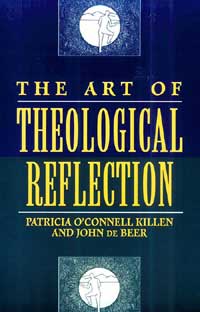“Art of Theological Reflection” is a popular title – John Shea (2003), Jane Kopas (1983) and Ronald Gariboldi (1987) have all used the phrase in the names of their books. In this post, however, I want to look at the work of Patricia O’Connell Killen and John De Beer in their book, published in 1994 by Crossroad Publishing Company.

Patricia O’Connell Killen is Professor of American Religious History, and chair of the Department of Religion at Pacific Lutheran University in Tacoma, Washington. John De Beer was until very recently rector at St Martins in the Field Episcopal Church, in Severna, Maryland. He has moved to Massachussetts. Patricia and John were both on the staff at University of the South where they developed their approach to theological reflection. Patricia has continued as part time professor with the Episcopal Diocese of Southeast Florida.


I found this book very helpful – developing an approach that draws insight and action from reflection on significant experience. Participants in this model are encouraged to share their stories, explore feelings, images, and insights that lead to action. Participants are then led to intentionally connect their lived narrative with the Christian tradition, being aware of their own convictions and the influence of their cultural environment. Patricia and John have written this book with their model in mind. They’ve included images that evoke the sense of exploring experience.
They’ve outlined their theories in graphic diagrams. One such diagram outlines the interplay between tradition and experience. Standing in tradition alone is described as a standpoint of certitide. Standing in experience alone is described as self-assurance. Healthy theological reflections calls one to stand in the crossover of the two spheres.
The authors provide nine templates or designs for theological reflection, starting with life situation, scripture (tradition), scripture and written meditation (tradition), essay (cultural text), collection of resources on one theme (cultural text), an issue or theme, personal positions, religious experiences, and another’s theological text.
I recently used the ‘experience to action’ phase at a multimedia conference in which participants were looking at developing cutting edge approaches to worship in the ’emerging church’. I took the line that the freshest experience of emerging church is to be found in last week’s personal and corporate experience. Some were astounded at the level of insight that came from exploring an ‘ordinary human experience’. The challenge then came as we brought our narratives, feelings, images, insights and actions to engage with the Scriptures and the cultural forms in which we engaged with our peers.
